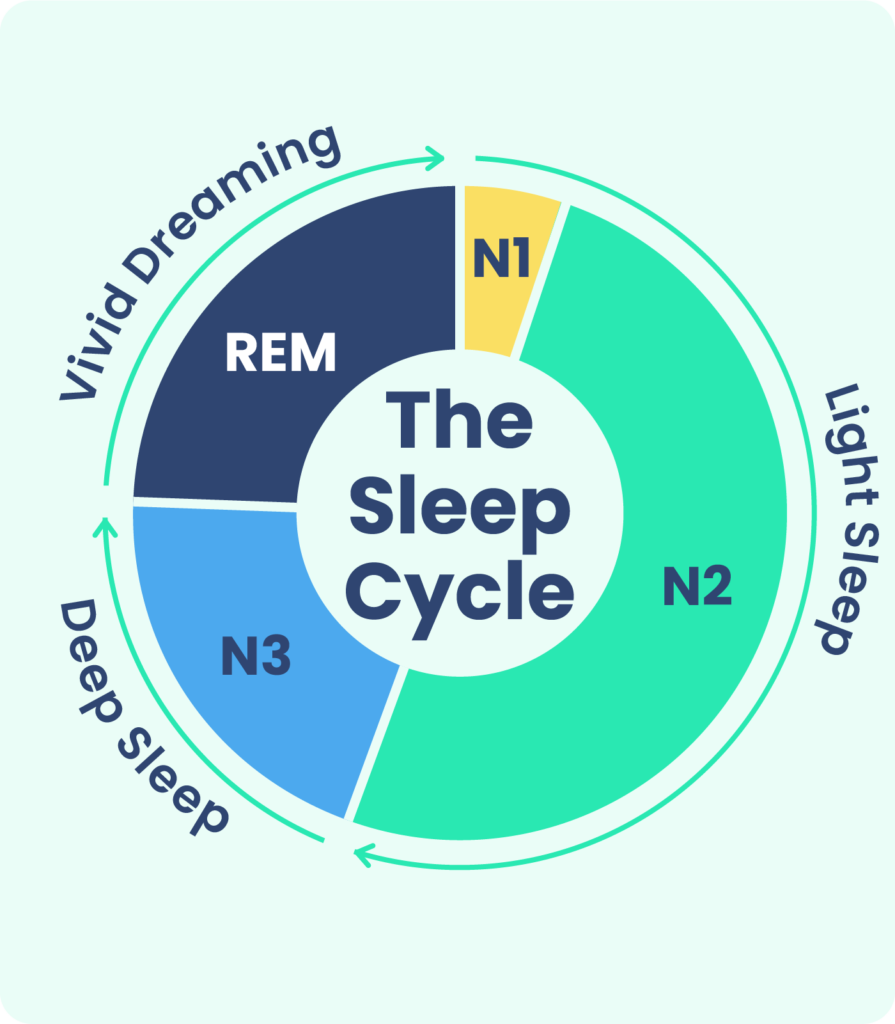Stress is a common part of our lives, but have you ever wondered about its impact on our sleep? Specifically, what impact does stress have on REM sleep? REM sleep, which stands for Rapid Eye Movement, is a crucial stage of sleep where dreams occur. It plays a vital role in memory consolidation, learning, and overall cognitive function. So, it’s important to understand how stress affects our REM sleep and what that means for our overall well-being.
When it comes to stress and sleep, it’s no secret that they often go hand in hand. We’ve all experienced those nights where our minds are racing with worries and concerns, making it difficult to fall asleep or stay asleep. But what exactly happens to our REM sleep when stress takes center stage? Research suggests that stress can disrupt the normal pattern of REM sleep, leading to reduced REM sleep duration and quality. This means that even if you manage to clock in the recommended hours of sleep, the impact of stress can still affect the quality of your rest. So, let’s dive deeper into the relationship between stress and REM sleep to uncover how they intertwine and what you can do to promote better sleep despite the daily stresses of life. By understanding the impact of stress on REM sleep, you’ll be better equipped to prioritize your sleep and overall well-being.
Understanding the Impact of Stress on REM Sleep
Stress is an inevitable part of life, and its effects can extend beyond our waking hours. One area that can be significantly impacted by stress is our sleep, particularly Rapid Eye Movement (REM) sleep. REM sleep is a crucial stage of the sleep cycle characterized by vivid dreaming and rapid eye movements. It is during this stage that our brains consolidate memories, process emotions, and rejuvenate. However, when stress levels are elevated, it can disrupt the quality and quantity of REM sleep, leading to various consequences for our mental and physical well-being.
The Relationship Between Stress and REM Sleep
When we experience stress, our bodies release stress hormones like cortisol, which can interfere with our sleep patterns. One study published in the journal Sleep found that higher levels of stress were associated with a reduction in REM sleep duration and an increase in the time it took to fall asleep. This disruption in REM sleep can have a cascading effect on other aspects of our health, including mood, cognitive function, and overall sleep quality.
Stress-induced sleep disturbances can manifest in different ways. Some individuals may experience difficulty falling asleep, while others may struggle with maintaining sleep throughout the night. These disruptions can lead to fragmented sleep and a decrease in the overall time spent in REM sleep. As a result, the brain’s ability to process emotions and memories may be compromised, affecting our mental and emotional well-being.
Effects of Stress on REM Sleep
1. Emotional Regulation: REM sleep plays a crucial role in emotional regulation. It is during this stage that our brains process and integrate emotions, helping us maintain emotional balance. When stress disrupts REM sleep, it can lead to difficulties in regulating emotions, increasing the likelihood of mood swings, irritability, and heightened stress levels.
2. Memory Consolidation: REM sleep is also closely linked to memory consolidation. It is during this stage that our brains strengthen and solidify memories, enhancing learning and cognitive function. When stress interferes with REM sleep, it can impair memory consolidation, affecting our ability to retain information and perform cognitive tasks effectively.
3. Mental Health: Chronic stress and disrupted REM sleep have been associated with an increased risk of mental health disorders such as anxiety and depression. Adequate REM sleep is essential for maintaining optimal mental health, and any disturbances in this stage can contribute to the development or exacerbation of mental health conditions.
4. Physical Health: The impact of stress on REM sleep is not limited to mental health; it can also affect our physical well-being. Studies have shown that disrupted REM sleep is associated with an increased risk of cardiovascular diseases, obesity, and compromised immune function. Adequate REM sleep is necessary for the body to repair and rejuvenate, and chronic stress can hinder this restorative process.
Managing Stress and Improving REM Sleep
While it may be challenging to completely eliminate stress from our lives, there are strategies we can implement to manage stress and improve the quality of our REM sleep.
1. Stress Reduction Techniques
Engaging in stress reduction techniques can help alleviate the negative impact of stress on REM sleep. These techniques may include mindfulness meditation, deep breathing exercises, yoga, or engaging in hobbies that promote relaxation. By incorporating these practices into our daily routines, we can effectively manage stress levels and promote better sleep.
2. Establishing a Bedtime Routine
Creating a consistent bedtime routine can signal to our bodies that it is time to unwind and prepare for sleep. This routine may involve activities such as reading, taking a warm bath, or listening to calming music. By establishing a regular sleep schedule and engaging in relaxing activities before bed, we can promote better sleep hygiene and enhance our chances of experiencing quality REM sleep.
3. Creating a Sleep-Friendly Environment
Optimizing our sleep environment can contribute to better sleep quality. This includes ensuring that our bedroom is cool, dark, and quiet, as well as minimizing any potential distractions. Investing in a comfortable mattress and pillows that support our sleep posture can also improve our chances of achieving restful REM sleep.
4. Seeking Professional Help
If stress continues to significantly impact sleep quality and overall well-being, it may be beneficial to seek professional help. Consulting with a healthcare provider or a sleep specialist can provide valuable insights and guidance on managing stress and improving REM sleep.
In conclusion, stress can have a profound impact on REM sleep, affecting our emotional, cognitive, and physical well-being. By implementing stress reduction techniques, establishing a bedtime routine, creating a sleep-friendly environment, and seeking professional help when necessary, we can mitigate the negative effects of stress and promote healthier REM sleep patterns. Taking proactive steps to manage stress can lead to improved overall sleep quality and contribute to our overall health and well-being.
Key Takeaways: What impact does stress have on REM sleep?
- Stress can disrupt REM sleep, which is the stage of sleep associated with dreaming.
- High levels of stress can lead to difficulties falling asleep and staying asleep during REM sleep.
- Stress can cause nightmares and vivid dreams during REM sleep.
- Chronic stress can contribute to sleep disorders like insomnia and sleep apnea, which can further impact REM sleep.
- Practicing stress management techniques, such as deep breathing and relaxation exercises, can help improve REM sleep quality.
Frequently Asked Questions
How does stress affect REM sleep?
Stress can have a significant impact on REM sleep, which is the stage of sleep when dreaming occurs. When we experience stress, our bodies release stress hormones such as cortisol, which can interfere with the normal sleep cycle. These hormones can disrupt the timing and duration of REM sleep, leading to less time spent in this important stage of sleep.
Additionally, stress can cause an increase in brain activity during sleep, making it harder to enter and maintain REM sleep. This can result in fragmented and shallow sleep, reducing the overall quality of sleep. As a result, individuals who are experiencing high levels of stress may find themselves waking up frequently throughout the night and feeling less rested in the morning.
Can stress cause nightmares during REM sleep?
Yes, stress can contribute to the occurrence of nightmares during REM sleep. When we are under stress, our minds are often preoccupied with worrisome thoughts and emotions. These can manifest in dreams during REM sleep, leading to the experience of nightmares.
Stress can also increase the likelihood of having intense and vivid dreams, which can further contribute to the occurrence of nightmares. These nightmares can be distressing and disruptive, causing discomfort and difficulty in returning to sleep. Managing stress and finding healthy coping mechanisms can help reduce the frequency and intensity of nightmares during REM sleep.
Does stress affect the duration of REM sleep?
Yes, stress can affect the duration of REM sleep. When we are stressed, our bodies are in a heightened state of alertness, making it harder to relax and enter the deep stages of sleep, including REM sleep. As a result, the duration of REM sleep may be shortened.
Stress can also cause disruptions in the sleep cycle, leading to a decrease in the overall amount of time spent in REM sleep. This can have a negative impact on the restorative properties of sleep and contribute to feelings of fatigue and grogginess upon waking. Prioritizing stress management techniques and creating a relaxing bedtime routine can help promote longer and more restful REM sleep.
Can stress-induced insomnia affect REM sleep?
Yes, stress-induced insomnia can affect REM sleep. Insomnia refers to difficulty falling asleep, staying asleep, or experiencing non-restorative sleep. When stress is present, it can exacerbate these sleep disturbances, leading to a decrease in the amount and quality of REM sleep.
Individuals with stress-induced insomnia may have a harder time falling asleep or may wake up frequently throughout the night. This can disrupt the normal sleep cycle, including the duration and timing of REM sleep. As a result, they may experience a decrease in the restorative benefits of REM sleep, such as memory consolidation and emotional processing.
What are some strategies to manage stress and improve REM sleep?
There are several strategies that can help manage stress and improve REM sleep. Firstly, establishing a consistent sleep schedule and creating a relaxing bedtime routine can signal to the body that it’s time to unwind and prepare for sleep. This can help promote the onset and maintenance of REM sleep.
Engaging in stress-reducing activities such as meditation, deep breathing exercises, or gentle stretching before bed can also help calm the mind and body, making it easier to transition into REM sleep. It’s important to create a sleep environment that is conducive to relaxation, such as keeping the bedroom cool, dark, and quiet.
Additionally, practicing good sleep hygiene, such as avoiding stimulants like caffeine and electronics before bed, can support healthy sleep patterns and enhance REM sleep. Seeking professional help from a therapist or sleep specialist can also provide guidance on stress management techniques and address any underlying sleep disorders that may be impacting REM sleep.
Too much REM sleep: why do depressed people wake up exhausted? | Human Givens
Final Thoughts on the Impact of Stress on REM Sleep
After exploring the topic of the impact of stress on REM sleep, it is clear that stress can significantly disrupt our sleep patterns, particularly when it comes to the REM stage. REM sleep is a crucial phase of our sleep cycle, as it is associated with memory consolidation, emotional regulation, and overall cognitive functioning. However, when stress enters the picture, it can wreak havoc on our ability to achieve and maintain quality REM sleep.
Stress triggers the release of cortisol, the stress hormone, which can interfere with the normal progression of sleep cycles, including REM sleep. High levels of stress can lead to reduced REM sleep duration, fragmented sleep, and even complete deprivation of REM sleep. This can have detrimental effects on our mental and emotional well-being, leading to difficulties with concentration, memory problems, mood disturbances, and an overall decrease in cognitive performance.
In conclusion, it is essential to prioritize stress management techniques in order to protect the quality of our REM sleep. By implementing strategies such as regular exercise, mindfulness practices, and establishing a relaxing bedtime routine, we can minimize the impact of stress on our sleep and promote a healthier, more restorative REM sleep. Remember, taking care of our mental and emotional well-being is crucial for achieving optimal sleep and overall health.




